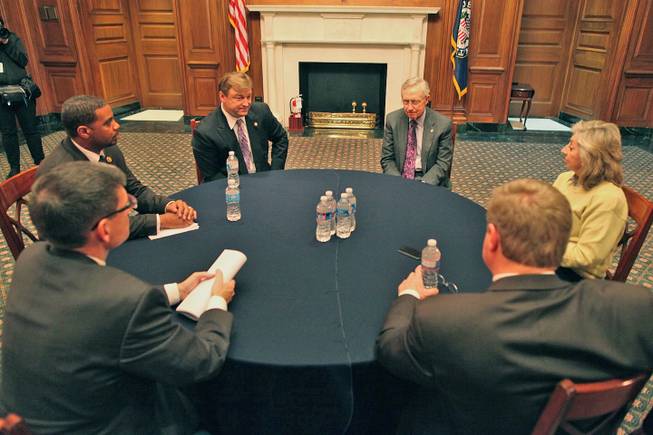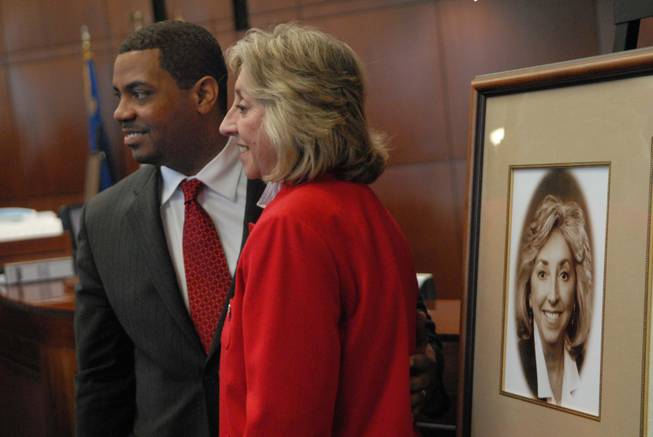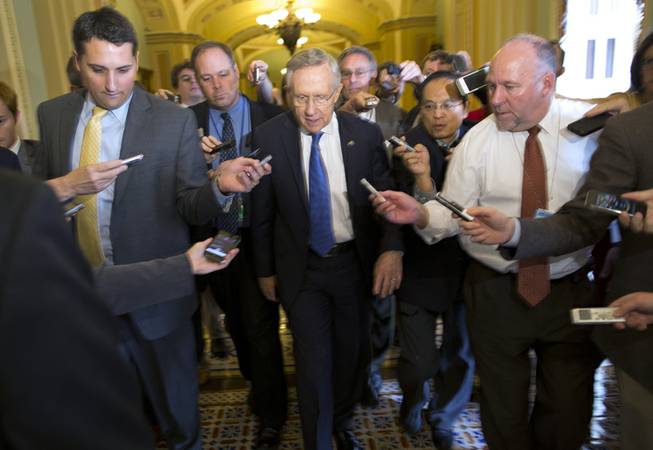
Nevada’s full congressional delegation met in the Mike Mansfield Room of the U.S. Capitol to discuss Nevada policy for the first time in several years, Wednesday, Feb. 13, 2013.
Tuesday, Oct. 15, 2013 | 2 a.m.
The tentative deal between Senate leaders Harry Reid and Mitch McConnell reached Monday is a big step toward resolving the fiscal crisis that has kept the federal government partially shut down for two weeks and threatens to make the country hit its debt limit in just two days.
But many hurdles still exist before a tentative deal becomes a durable solution — and at each is the potential that the whole thing could take a default-inducing tumble.
Will Republicans resist Tea Party pressure and take a compromise vote? Will Democrats support a compromise with certain concessions instead of the unadulterated budget resolution and long-term debt limit hike they wanted?
The Nevada delegation, with members in every party camp of Congress, will have to weather all of these political challenges as they decide how to vote in the hours ahead.
Here are five things to look for as they do:
-

House Dems: Do Steven Horsford and Dina Titus back their party?
Before you roll your eyes, consider the following: Though Reps. Steven Horsford and Dina Titus are fairly loyal members of the House Democratic conference — both vote with their party 94 percent of the time, according to a Washington Post vote analysis — each has broken with their party over major fiscal issues in the past.
On the eve of the current government shutdown, Horsford voted in favor of a Republican budget measure that would have ended subsidies for members and staffers of Congress purchasing their health care plans on the Affordable Care Act exchanges. The vote was taken on principle, he argued, because if certain union members belonging to Taft-Hartley insurance plans wouldn’t be eligible for subsidies, Congress shouldn't be either, he reasoned. Nonetheless, it ran directly counter to the Democrats’ position — and Horsford was one of only nine House Democrats who dared take such a vote.
Although Titus hasn’t done anything like that recently, she, too, has taken votes of principle. The last time she was in Congress, she was one of the few Democrats to vote against the Affordable Care Act as it was in development in 2009, though she later voted in favor of the law.
The final deal will not be the clean continuing resolution or the long-term debt limit suspension that Horsford and Titus have been angling for, and it likely will contain some restrictions on the health care law better known as Obamacare.
The deal also will likely lock in spending levels to at least partially reflect the sequester that will be lower than what Democrats wanted.
So, will Horsford and Titus swallow hard and vote to steer the country away from default or make a contrarian stand? It is the first major, "fiscal cliff"-style vote either has had to take this congressional session, so we will have to wait and see.
-

Does Dean Heller break his streak?
Republican Sen. Dean Heller has been willing to vote for budget extensions in the past. But when it comes to these hybrid budget votes that are intertwined with the debt limit and sequestration, Heller is the first to remind anyone within earshot that he is a consistent no vote — and has been since these cyclical crises started in 2011.
Nonetheless, the stakes of the present crisis are higher than any other fiscal conundrum in recent memory. In August 2011, when Heller voted against a deal to raise the debt limit in exchange for certain spending cuts, and establish the mechanism that would lead to sequestration, the country may have been at risk of default, but it wasn’t smack-dab in the midst of a government shutdown.
Will the present circumstances be enough to compel Heller to amend his principled stance? It’s unclear.
Ten months ago, he laid down his arms in favor of the high road and voted with the majority of Congress to allow tax rates on the wealthiest Americans to rise back to Clinton-era levels in the so-called fiscal cliff deal. But not without reminding his constituents how much he hated, and continues to despise, the sequestration arrangement that helped drive the fiscal cliff panic in the first place.
-

What the heck does Heck do?
More than any other member of the delegation, Republican Rep. Joe Heck likes to play his cards close to his chest. He’ll never tell you how he’s planning to vote on anything before the ink is dry, and more often than not, he won’t tip his hand until he’s safely cast his voting ballot on the House floor.
In particularly dicey and high-stakes votes, he’s been even more careful, eyeing the vote count as it ticks up before putting in his aye or nay — a tactic lawmakers employ when they don’t want the responsibility of being the guy to make or break a bill.
Still, it’s a rare thing when Heck will eschew a compromise deal in the face of a bleak fiscal crisis. Heck voted in favor of both the August 2011 fiscal cliff deal to raise the debt limit and set up the sequester, and the New Year’s 2013 fiscal cliff bill, even when a majority of his Republican colleagues wouldn’t take the same vote.
Heck, who represents one of the country’s purplest districts, may take some heat from his Democratic challengers for holding the party line through the negotiations. But when it comes to the moment of truth, it’s a rare thing for him to buck the product of bipartisan compromise.
-

Does Amodei toe the Tea Party line?
In the wake of last year’s fiscal cliff deal, Republican Rep. Mark Amodei confessed to the Sun a telling trepidation: He couldn’t vote for the compromise because he never could have explained the vote to those constituents who voted for Sharron Angle.
But this year, Amodei is citing a different segment of his constituency when he reasons his way through the current shutdown and debt ceiling crisis.
“Washoe County’s about even registration. … Dean Heller lost Washoe County to Jill Derby in his first run when it was an open seat,” Amodei told the Sun last week. “I don’t take anything for granted.”
This week, Amodei will have to decide which segment of his constituency his vote will respect: the moderates in Washoe County who would support compromise, or the Tea Party types, many of whom have downplayed the idea that hitting the debt limit would result in fiscal calamity.
But while Amodei may have lingering fears about Angle voters, it’s important to note that Amodei has yet to take a vote that may foreshadow how he’ll approach this one.
The fiscal cliff was a mix of overnight tax hikes and sequestration cuts but didn’t involve the potential of defaulting on the national debt in the midst of a government shutdown.
And Amodei has been candidly reserved in his expectations about final-stage negotiations: Once the government shut down, he didn’t expect the major concessions on Obamacare he’d previously been angling for to come to fruition. He just wanted to see something give on the other side of the aisle.
-

Does Reid’s game of hardball pay off?
This is the trillion-dollar question.
Reid has been resolute throughout the government shutdown, refusing to budge on tinkering seriously with the health care law, spending levels or entitlement reforms as a precondition for restoring the federal government’s funding and averting a crash into the debt ceiling.
He’s hammered relentlessly at Republicans, accusing them of hostage-taking and blaming them for the stagnation, lost jobs and increased uncertainty that the economy has experienced as a result of congressional stalemate.
Reid has taken a personal hit for this in the opinion polls. But it’s not nearly as big a knockdown as what the Republicans have experienced.
Plummeting approval ratings of the GOP not only play into Reid’s longer-term political ambitions but his present negotiating stance, as well. By calling Republicans’ bluff, he pushed his opponents to the wall, daring them to shut down the government and push the country to default. The government did shut down. But Reid’s bet seems to be paying off on the debt limit — that would have been too awful a prescription for the beleaguered Republicans to take the heat.
Of course, Reid won’t get exactly what he wanted, as the emerging deal between himself and McConnell is not a clean, short-term budget resolution and a no-strings-attached suspension of the debt limit through 2014. But it’s doubtless a better deal than he could have claimed on the eve of the shutdown.






Join the Discussion:
Check this out for a full explanation of our conversion to the LiveFyre commenting system and instructions on how to sign up for an account.
Full comments policy